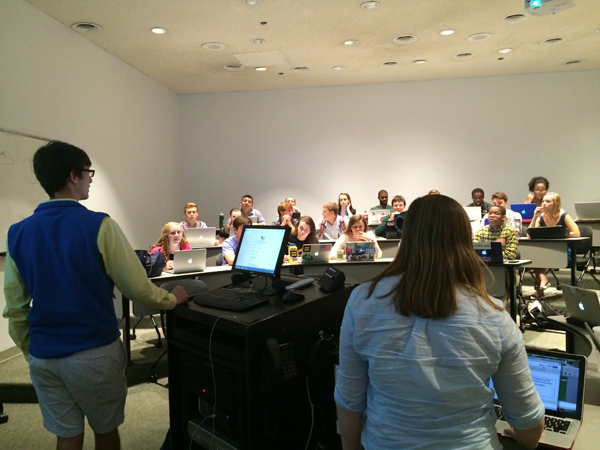The College of William and Mary’s Student Assembly senate unanimously approved the One Family Resolution Feb. 24. This bill was formerly known as the One Tribe Resolution.
The resolution addresses the College’s racial climate and mentions several means of improvement, one of which is implementing a Bias Reporting System.
“Resolved, that the Student Assembly calls for the implementation of a Bias Reporting System whereby students can more directly report issues of discrimination and bias in our community with the purpose of providing optional educational resources for students,” Clause Five of the One Family Resolution states.
The College previously had a Bias Incident Reporting System during College President Gene Nichol’s term. The system allowed students to anonymously report incidents of bias and discrimination. The American Council of Trustees opposed the system in 2007, and the College discontinued it in 2010 after some students protested anonymous reporting as a breach of constitutional free speech and due process rights.
When asked during the senate meeting if anonymous reporting would be allowed under the newly proposed Bias Reporting System, Sen. Yohance Whitaker ’15 said that was an aspect still being worked out through conversations with administration.
“The resolution isn’t a space to get into a lot of the technical detail. …This is an affirmation of the Student Assembly as a whole. … We recognize that this is an issue that needs to be addressed beyond words and that this is an issue that plagues students. While we have a great respect for free speech and want to make sure that the new system, unlike the previous system, doesn’t infringe on free speech, we also want to make sure that everyone feels safe going to class,” Sen. Chase Jordan ’15 said.
SA Secretary of College Policy and Student Rights Nate Heeter ’15 explained that while he supports the senate’s One Family Resolution, he said that he did feel that the resolution could have gone further.
“The resolution … was important,” Heeter said. “The Student Assembly expressed its support for those affected by bias and discrimination, especially in light of the things that have been happening around campus and the country this year. Looking at the language in the resolution itself, there is nothing inherently wrong with what the senate has suggested, other than that it leaves questions unanswered.”
Heeter said he thought the vagueness of the language in the resolution might have stemmed from senators not being able to agree upon one view of the system’s structure.
“I think the reason the language was so vague was because individual senators had very different views on what the system should look like,” Heeter said. “So the language that was expressed was the language that could gain a consensus. I wish the senate could have spent more time working out these differences so we could have a clearer statement from the senate. But again, the language itself was not inherently objectionable.”
Heeter emphasized his support for free speech and also discussed his hesitations regarding a bias reporting system. He said that he would not be comfortable with a system that would collect records or reach out to alleged perpetrators of biased incidents. He explained the resolution would have been more helpful if it had defined the parameters of a bias reporting system.
“I wish the resolution would have gone further to express the limitations and scope of any kind of bias reporting system,” Heeter said. “But the language contained in the resolution itself is not necessarily objectionable.”
Overall, Heeter said he supports the resolution, but retains concerns about the possible structure of the proposed Bias Reporting System.
In addition to proposing the implementation of a bias reporting system, the One Family Resolution resolves that the SA will continue its efforts toward dialogues on race on campus and will support programming initiatives that seek to educate the students about issues of diversity.
Additionally, Humans of William and Mary, a part of the SA Department of Diversity Initiatives, announced its intention to create a physical installation project entitled The HOWM Experience. It would be set up during the Day for Admitted Students and feature a collage of HOWM’s photos. HOWM would also photograph people viewing the project. The group requested $2,165 for building materials from the SA Reserves.
Vice President Kendall Lorenzen ’15 discussed the Release Act, a bill to allocate funds to hold an event in the Sunken Garden March 5 about healthy grieving practices. Participants would share poems and songs, write messages on biodegradable balloons for lost loved ones for release.
“In college, that’s when a lot of students experience the first major losses of their lives. … Ideally, what we would like to do with this event is make it become a tradition, whether it happens once a semester or once a year,” Lorenzen said.
Sen. Nadia Ilunga ’15 introduced the Incoming Student Outreach Act, which would inform incoming students during orientation periods about the Student Assembly. The bill requests the Student Assembly Reserves allocate $1,050 to put informational sheets about SA in students’ move-in bags and to send CSU postcards.
The Bills, Bills, Bills Act to reallocate leftover funds from the Beauty of Branding Act also passed unanimously.
Secretary of Transportation Gabriel Morey ’16 also updated the senate about the department of transportation. The Student Assembly’s airport shuttle program assisted about 700 students with transportation to local airports last semester. Future plans for the department include working with the Williamsburg Area Transit Authority to promote WATA’s services.
Flat Hat News Editor Madeline Bielski contributed to the reporting in this article


[…] the Task Force wasn’t enough. Later that month, the Student Assembly unanimously passed the One Tribe Resolution, a vaguely-worded bill that mandates the construction of a Bias Reporting System, in which students […]